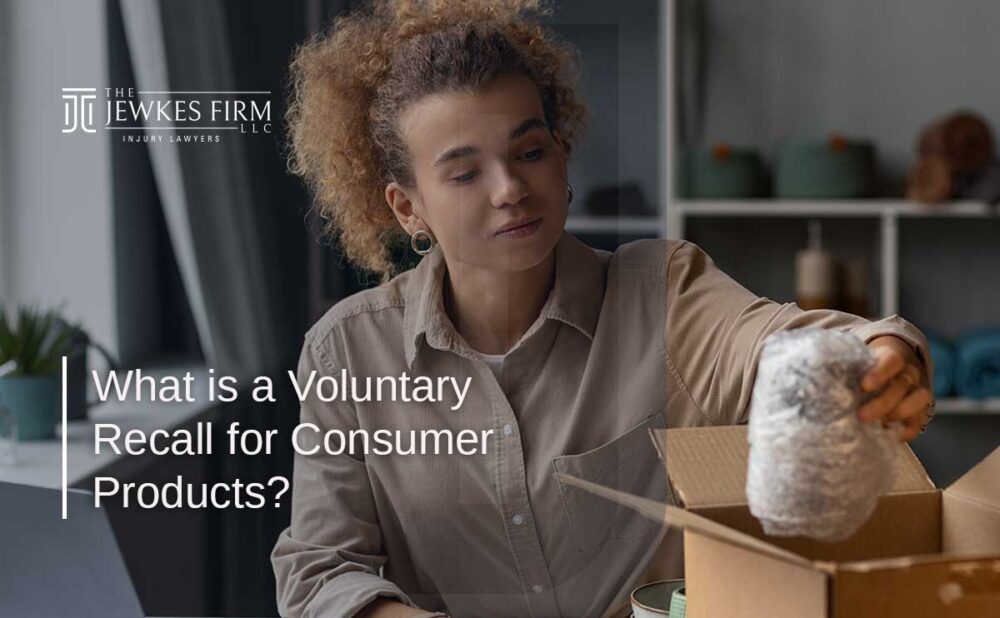What is a Voluntary Recall for Consumer Products?
In the realm of consumer safety, a voluntary recall is a critical mechanism that allows manufacturers to remove or correct products that may pose risks to consumers. While the term voluntary suggests a choice, companies often initiate these recalls in response to safety concerns. Recalls are essential for protecting public health. At The Jewkes Firm, with Attorney Jordan Jewkes at the forefront, we protect consumers and advocate for those harmed by defective or dangerous products. One critical aspect of product safety that all consumers should understand is the concept of a voluntary recall.
What Is a Voluntary Recall?
A voluntary recall occurs when a company or manufacturer chooses to remove or correct a defective or potentially harmful product from the market without being compelled to do so by a regulatory agency. Unlike mandatory recalls, which government bodies such as the U.S. Consumer Product Safety Commission (CPSC) order, companies initiate voluntary recalls themselves, often as a preemptive measure to protect consumers and reduce legal liability.
Voluntary recalls can involve a wide range of products including toys, electronics, household appliances, food items, automotive parts, and more.
Injured Due To A Defective Product? Contact Us For A Free Consultation
Injured Due To A Defective Product?
Why Do Companies Initiate Voluntary Recalls?
Companies may choose to initiate a voluntary recall for several reasons:
- Consumer Safety. To prevent potential harm to consumers from defective or hazardous products.
- Legal Protection. To mitigate the risk of lawsuits or regulatory actions that could arise from continued distribution of a harmful product.
- Brand Reputation. To maintain consumer trust and uphold the company’s image by demonstrating a commitment to safety.
Identifying a Voluntary Recall
When a company announces a voluntary recall, you might notice public communications such as:
- Press releases from the company
- Notifications posted on government websites like the CPSC or FDA
- News coverage and social media announcements
- Direct contact from the manufacturer or retailer (via email, mail, or phone)
These communications typically include information about the specific product, the nature of the defect or hazard, and instructions on what to do next—such as returning the product, seeking a replacement, or receiving a refund.
How Do Voluntary Recalls Work?
The process of a voluntary recall typically involves the following steps:
- Identification of the Issue. The company identifies a potential safety issue through internal testing, consumer feedback, or reports from regulatory agencies.
- Notification. The company notifies the appropriate regulatory bodies, such as the U.S. Consumer Product Safety Commission (CPSC) or the Food and Drug Administration (FDA), and the public about the recall.
- Corrective Action. The company implements corrective measures, which may include repairing, replacing, or refunding the affected products.
- Monitoring. The company monitors the effectiveness of the recall and removes all affected products from the market.
Legal Implications of Voluntary Recalls
While companies initiate voluntary recalls to protect consumers and reduce legal risks, voluntary recalls do not absolve companies from liability. If a recalled product injures a consumer, they may still have grounds for a product liability lawsuit, especially if the company was negligent in its duty to ensure product safety.
What Should Consumers Do During a Voluntary Recall?
If you have a product subject to a voluntary recall:
- Check for Recall Notices. Visit the manufacturer’s website or the CPSC or FDA websites to verify if the recall affects your product.
- Follow Instructions. Adhere to the manufacturer’s instructions regarding returning, repairing, or disposing of the product.
- Seek Medical Attention. If the product has injured you, consult a healthcare professional immediately.
- Consult Legal Advice. If you have suffered harm, consider seeking legal counsel to understand your rights and potential for compensation.
Examples of Recent Famous Voluntary Recalls
Understanding past voluntary recalls can highlight the scope and importance of these actions. Here are some recent examples that received wide attention:
Toyota Airbag Recall (2023)
Toyota voluntarily recalled over 3 million vehicles worldwide due to faulty airbags manufactured by Takata. These airbags could deploy improperly and cause serious injury or death.
Peloton Tread+ Treadmill Recall (2021)
Following incidents of injuries and a child’s death, Peloton proactively recalled its Tread+ treadmill to address safety concerns around accidental trapping and falls.
Keurig Green Mountain Coffee Makers (2020)
Keurig recalled more than 7 million coffee makers due to reports of fire hazards that posed risks of burns or property damage.
Olivari Baby Products (2022)
This manufacturer recalled certain baby swings and bouncers after identifying reports of injuries and safety concerns to protect infants.
These cases show how voluntary recalls often serve as a first line of defense in preventing harm, but also remind consumers to stay vigilant about product safety.

GEORGIA PERSONAL INJURY LAWYER NEAR ME
When to Contact The Jewkes Firm
Even with a voluntary recall, defective products unfortunately injure some consumers—sometimes before companies announce the recall or despite warnings. If you or a loved one has been hurt by a product under a voluntary recall, you may recover compensation for medical bills, lost wages, pain and suffering, and more.
Attorney Jordan Jewkes and our legal team specialize in personal injury cases involving faulty consumer products. We understand the complexities of product liability and recall-related claims. We can help you:
- Investigate what went wrong
- Determine if you have a claim against the manufacturer or distributor
- Advocate fiercely for your rights in negotiations or court
Why Trust The Jewkes Firm?
- Experience. We have successfully handled numerous personal injury and product liability cases.
- Client-Focused. We prioritize your well-being and keep you informed every step of the way.
- No Fee Unless We Win. We work on a contingency basis, so you pay nothing upfront.
Voluntary recalls play a vital role in consumer safety, allowing companies to address potential hazards proactively. As a consumer, it’s important to stay informed about recalls and take appropriate action to protect yourself and your loved ones. If you believe a recalled product has caused you injury, contact The Jewkes Firm and Attorney Jordan Jewkes at (770) 771-5130 for a free consultation. Let us help you hold negligent manufacturers accountable and pursue the justice you deserve.
Frequently Asked Questions
Is a voluntary recall the same as a mandatory recall?
No. The company or manufacturer initiates a voluntary recall on their own accord, whereas government authorities such as the CPSC or FDA order a mandatory recall, often after an investigation.
How can I find out if a product is recalled?
Check government websites like the U.S. Consumer Product Safety Commission (www.cpsc.gov) or the Food & Drug Administration (www.fda.gov). Companies may also notify customers directly via email or mail.
Am I required to return a product that is voluntarily recalled?
It depends on the recall instructions. Some recalls ask you to return the product or bring it back to the store for a refund or repair. Others may recommend simply discontinuing use. Always follow the official guidance.
What if a product injured me before or after the recall?
You may recover compensation if a defective product caused your injury. It’s important to consult with an experienced personal injury attorney, such as Attorney Jordan Jewkes, to discuss your case.
Does filing a claim affect the recall process?
No. Your right to pursue legal action is separate from the recall itself. Pursuing compensation helps hold companies accountable and may promote safer products.




